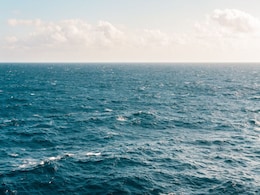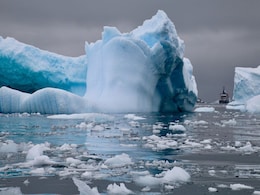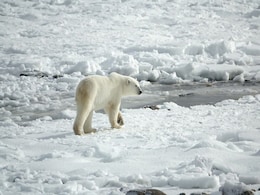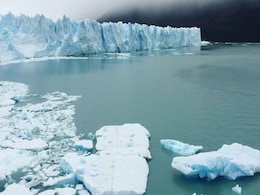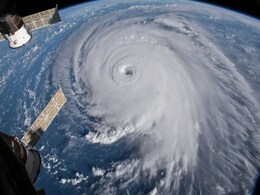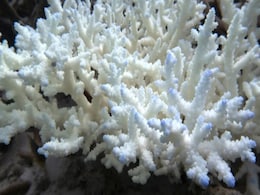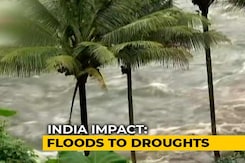Warming Oceans
- All
- News
- Videos
-

Ocean Warming Rate Quadruples Over Four Decades, Accelerating Climate Change
- Friday January 31, 2025
- Written by Gadgets 360 Staff
New research highlights a troubling acceleration in ocean warming, with the rate of temperature rise quadrupling since the 1980s. According to a study in Environmental Research Letters, ocean surface temperatures now rise at 0.27°C per decade, up from 0.06°C. This rapid warming, driven by greenhouse gases like CO2 and methane, is worsening Earth'...
-
 www.gadgets360.com
www.gadgets360.com
-

Ocean Surface Warming 4 Times Faster Than It Did In 1980s: Study
- Tuesday January 28, 2025
- World News | Indo-Asian News Service
This accelerating warming underscores the urgency of reducing fossil fuel burning to prevent even more rapid temperature increases in the future.
-
 www.ndtv.com
www.ndtv.com
-

Arctic Ocean Likely to Experience Ice-Free Day by 2027, Study Warns
- Thursday December 5, 2024
- Written by Gadgets 360 Staff
A study published in Nature Communications predicts the Arctic Ocean could face its first ice-free day as early as 2027, marking a critical environmental milestone. Conducted using 11 climate models and 366 simulations, the research highlights the urgent need for emission reductions. The loss of sea ice in the Arctic exacerbates global warming thro...
-
 www.gadgets360.com
www.gadgets360.com
-

NASA's Twin Mini Satellites Captures Far-Infrared Radiation from Polar Regions
- Thursday December 5, 2024
- Written by Gadgets 360 Staff
NASA’s PREFIRE mission, launched in 2024, is utilizing CubeSats to capture groundbreaking data on far-infrared radiation emitted from polar regions. These measurements, which track heat escaping from the Arctic and Antarctic, provide critical insights into Earth’s energy balance, a key component in understanding climate change. Despite encounte...
-
 www.gadgets360.com
www.gadgets360.com
-

Rising Seas To Cost Pacific Island Nations $10 Billion - Their 20-Year GDP
- Thursday November 14, 2024
- World News | Reuters
Adapting to a sea level rise of up to 0.5 metres (1.64 feet) will cost the three most vulnerable Pacific atoll nations nearly $10 billion - equivalent to about 20 years of gross domestic product - the World Bank said in a report on Thursday.
-
 www.ndtv.com
www.ndtv.com
-

New Study Reveals Weaker Atlantic Current Could Mitigate Arctic Warming
- Monday November 4, 2024
- Written by Gadgets 360 Staff
Recent research from UC Riverside reveals that a weakening Atlantic Meridional Overturning Circulation (AMOC) could limit Arctic temperature increases by up to 2 degrees Celsius by the end of the century. While this slowdown may offer some relief, ongoing threats to Arctic wildlife and potential global weather disruptions remain a serious concern. ...
-
 www.gadgets360.com
www.gadgets360.com
-

Study Warns Melting Arctic Ice Could Disrupt Ocean Currents in Europe
- Monday October 28, 2024
- Written by Gadgets 360 Staff
Scientists from UiT The Arctic University of Norway have issued a stark warning regarding the impact of melting Arctic sea ice on global ocean circulation patterns. Their recent study highlights that significant inflows of freshwater from melting sea ice into the Nordic Seas have historically led to dramatic cooling in northern Europe. By analysing...
-
 www.gadgets360.com
www.gadgets360.com
-

Will Hurricanes Become Even Stronger as the Planet Warms?
- Thursday October 10, 2024
- Written by Gadgets 360 Staff
Hurricanes derive their strength from warm ocean waters, with current theoretical wind speed limits around 200 mph. However, as global temperatures continue to rise due to climate change, experts predict hurricanes could intensify even further. This increase in ocean heat may push the limits, potentially resulting in stronger storms with winds exce...
-
 www.gadgets360.com
www.gadgets360.com
-

Atlantic Ocean Might Be Undergoing a Rapid Cooling Near Equator And Scientists Do Not Know Why
- Friday August 30, 2024
- Written by Gadgets 360 Staff
A significant portion of the Atlantic Ocean near the equator experienced a rapid and unprecedented cooling over the summer months, leaving scientists puzzled about the cause. While the temperatures in the area have started to climb back to normal levels, the reasons behind this sudden drop remain unclear. The cold patch, which appeared in early Jun...
-
 www.gadgets360.com
www.gadgets360.com
-

Climate Change Could Make Earth's Oldest Microorganisms Dominant in Oceans, Study Reveals
- Tuesday August 20, 2024
- Gadgets 360 Staff
New research highlights a significant shift in marine ecosystems due to climate change. Prokaryotes, the oldest and smallest microorganisms on Earth, are expected to become more dominant as ocean temperatures rise. These microorganisms, which include bacteria and archaea, play a crucial role in marine nutrient cycles and food chains. However, their...
-
 www.gadgets360.com
www.gadgets360.com
-

Great Barrier Reef Faces Hottest Ocean Temperatures in 400 Years, Threatening Coral Survival
- Tuesday August 13, 2024
- NDTV
The Great Barrier Reef, one of Earth's most significant natural treasures, is currently experiencing its hottest sea surface temperatures in four centuries. According to a study published in Nature, the first quarter of 2024 recorded a temperature rise of 0.19°C above the previous peak. This extreme warming is directly linked to extensive coral bl...
-
 www.gadgets360.com
www.gadgets360.com
-

How Rise In Ocean Temperatures Is Threatening Marine Life
- Thursday August 8, 2024
- World News | Alex Sen Gupta, UNSW and Katie Smith, Marine Biological Association, 360info
Since April, the world has seen record high ocean temperatures and that's bad news for the plants and animals that call the ocean home.
-
 www.ndtv.com
www.ndtv.com
-

Antarctic Study Reveals "Tipping Point" For Runaway Melting Of Ice Sheets
- Tuesday June 25, 2024
- World News | Agence France-Presse
Scientists have discovered a new tipping point toward "runaway melting" of Antarctic ice sheets, caused by warm ocean water intruding between the ice and the land it sits on, according to a study published on Tuesday.
-
 www.ndtv.com
www.ndtv.com
-

Indian Ocean Likely To See Near-Permanent Heatwave: Study
- Tuesday April 30, 2024
- India News | Reported by Vishnu Som
Sounding a warning, a study has revealed that the warming of the Indian Ocean is going to lead to the worsening of severe cyclones and heavy rainfall events and that the world's 3rd-largest water body is moving to a near-permanent heatwave state.
-
 www.ndtv.com
www.ndtv.com
-

"Planet On The Brink": UN As 2014-2023 Recorded Hottest Decade Ever
- Tuesday March 19, 2024
- World News | Agence France-Presse
Global heat records were "smashed" last year, the UN confirmed Tuesday, with 2023 rounding out the hottest decade on record, as heatwaves stalked oceans and glaciers suffered record ice loss.
-
 www.ndtv.com
www.ndtv.com
-

Ocean Warming Rate Quadruples Over Four Decades, Accelerating Climate Change
- Friday January 31, 2025
- Written by Gadgets 360 Staff
New research highlights a troubling acceleration in ocean warming, with the rate of temperature rise quadrupling since the 1980s. According to a study in Environmental Research Letters, ocean surface temperatures now rise at 0.27°C per decade, up from 0.06°C. This rapid warming, driven by greenhouse gases like CO2 and methane, is worsening Earth'...
-
 www.gadgets360.com
www.gadgets360.com
-

Ocean Surface Warming 4 Times Faster Than It Did In 1980s: Study
- Tuesday January 28, 2025
- World News | Indo-Asian News Service
This accelerating warming underscores the urgency of reducing fossil fuel burning to prevent even more rapid temperature increases in the future.
-
 www.ndtv.com
www.ndtv.com
-

Arctic Ocean Likely to Experience Ice-Free Day by 2027, Study Warns
- Thursday December 5, 2024
- Written by Gadgets 360 Staff
A study published in Nature Communications predicts the Arctic Ocean could face its first ice-free day as early as 2027, marking a critical environmental milestone. Conducted using 11 climate models and 366 simulations, the research highlights the urgent need for emission reductions. The loss of sea ice in the Arctic exacerbates global warming thro...
-
 www.gadgets360.com
www.gadgets360.com
-

NASA's Twin Mini Satellites Captures Far-Infrared Radiation from Polar Regions
- Thursday December 5, 2024
- Written by Gadgets 360 Staff
NASA’s PREFIRE mission, launched in 2024, is utilizing CubeSats to capture groundbreaking data on far-infrared radiation emitted from polar regions. These measurements, which track heat escaping from the Arctic and Antarctic, provide critical insights into Earth’s energy balance, a key component in understanding climate change. Despite encounte...
-
 www.gadgets360.com
www.gadgets360.com
-

Rising Seas To Cost Pacific Island Nations $10 Billion - Their 20-Year GDP
- Thursday November 14, 2024
- World News | Reuters
Adapting to a sea level rise of up to 0.5 metres (1.64 feet) will cost the three most vulnerable Pacific atoll nations nearly $10 billion - equivalent to about 20 years of gross domestic product - the World Bank said in a report on Thursday.
-
 www.ndtv.com
www.ndtv.com
-

New Study Reveals Weaker Atlantic Current Could Mitigate Arctic Warming
- Monday November 4, 2024
- Written by Gadgets 360 Staff
Recent research from UC Riverside reveals that a weakening Atlantic Meridional Overturning Circulation (AMOC) could limit Arctic temperature increases by up to 2 degrees Celsius by the end of the century. While this slowdown may offer some relief, ongoing threats to Arctic wildlife and potential global weather disruptions remain a serious concern. ...
-
 www.gadgets360.com
www.gadgets360.com
-

Study Warns Melting Arctic Ice Could Disrupt Ocean Currents in Europe
- Monday October 28, 2024
- Written by Gadgets 360 Staff
Scientists from UiT The Arctic University of Norway have issued a stark warning regarding the impact of melting Arctic sea ice on global ocean circulation patterns. Their recent study highlights that significant inflows of freshwater from melting sea ice into the Nordic Seas have historically led to dramatic cooling in northern Europe. By analysing...
-
 www.gadgets360.com
www.gadgets360.com
-

Will Hurricanes Become Even Stronger as the Planet Warms?
- Thursday October 10, 2024
- Written by Gadgets 360 Staff
Hurricanes derive their strength from warm ocean waters, with current theoretical wind speed limits around 200 mph. However, as global temperatures continue to rise due to climate change, experts predict hurricanes could intensify even further. This increase in ocean heat may push the limits, potentially resulting in stronger storms with winds exce...
-
 www.gadgets360.com
www.gadgets360.com
-

Atlantic Ocean Might Be Undergoing a Rapid Cooling Near Equator And Scientists Do Not Know Why
- Friday August 30, 2024
- Written by Gadgets 360 Staff
A significant portion of the Atlantic Ocean near the equator experienced a rapid and unprecedented cooling over the summer months, leaving scientists puzzled about the cause. While the temperatures in the area have started to climb back to normal levels, the reasons behind this sudden drop remain unclear. The cold patch, which appeared in early Jun...
-
 www.gadgets360.com
www.gadgets360.com
-

Climate Change Could Make Earth's Oldest Microorganisms Dominant in Oceans, Study Reveals
- Tuesday August 20, 2024
- Gadgets 360 Staff
New research highlights a significant shift in marine ecosystems due to climate change. Prokaryotes, the oldest and smallest microorganisms on Earth, are expected to become more dominant as ocean temperatures rise. These microorganisms, which include bacteria and archaea, play a crucial role in marine nutrient cycles and food chains. However, their...
-
 www.gadgets360.com
www.gadgets360.com
-

Great Barrier Reef Faces Hottest Ocean Temperatures in 400 Years, Threatening Coral Survival
- Tuesday August 13, 2024
- NDTV
The Great Barrier Reef, one of Earth's most significant natural treasures, is currently experiencing its hottest sea surface temperatures in four centuries. According to a study published in Nature, the first quarter of 2024 recorded a temperature rise of 0.19°C above the previous peak. This extreme warming is directly linked to extensive coral bl...
-
 www.gadgets360.com
www.gadgets360.com
-

How Rise In Ocean Temperatures Is Threatening Marine Life
- Thursday August 8, 2024
- World News | Alex Sen Gupta, UNSW and Katie Smith, Marine Biological Association, 360info
Since April, the world has seen record high ocean temperatures and that's bad news for the plants and animals that call the ocean home.
-
 www.ndtv.com
www.ndtv.com
-

Antarctic Study Reveals "Tipping Point" For Runaway Melting Of Ice Sheets
- Tuesday June 25, 2024
- World News | Agence France-Presse
Scientists have discovered a new tipping point toward "runaway melting" of Antarctic ice sheets, caused by warm ocean water intruding between the ice and the land it sits on, according to a study published on Tuesday.
-
 www.ndtv.com
www.ndtv.com
-

Indian Ocean Likely To See Near-Permanent Heatwave: Study
- Tuesday April 30, 2024
- India News | Reported by Vishnu Som
Sounding a warning, a study has revealed that the warming of the Indian Ocean is going to lead to the worsening of severe cyclones and heavy rainfall events and that the world's 3rd-largest water body is moving to a near-permanent heatwave state.
-
 www.ndtv.com
www.ndtv.com
-

"Planet On The Brink": UN As 2014-2023 Recorded Hottest Decade Ever
- Tuesday March 19, 2024
- World News | Agence France-Presse
Global heat records were "smashed" last year, the UN confirmed Tuesday, with 2023 rounding out the hottest decade on record, as heatwaves stalked oceans and glaciers suffered record ice loss.
-
 www.ndtv.com
www.ndtv.com

